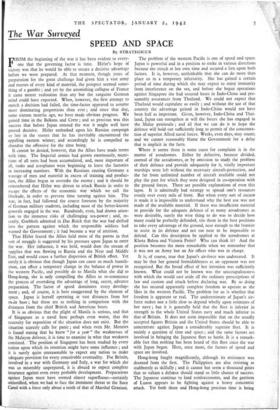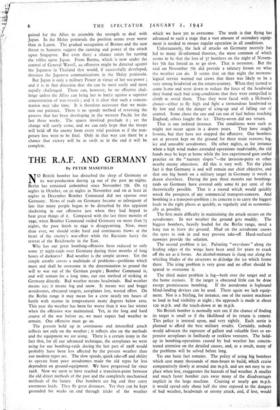The War Surveyed
SPEED AND SPACE
By STRATEGICUS
FROM the beginning of the war it has been evident to every- one that the governing factor is time. Hitler's hope of victory was that he would be able to secure a decisive advantage before we were prepared. At that moment, though years of preparation for the great challenge had given him a vast army and masses of every kind of material, the prospect seemed some- thing of a gamble ; and yet by the astonishing collapse of France it came nearer realisation than any but the sanguine German mind could have expected. When, however, the first attempt to snatch a decision had failed, the time-factor appeared to assume more dominating proportions than ever ; and since that day, some sixteen months ago, we have made obvious progress. We gained time in the Balkans and Crete ; and so precious was this success that before Japan entered the war it might well have proved decisive. Hitler embarked upon his Russian campaign so late in the season that he has inevitably encountered the appalling eastern winter; and accordingly he is compelled to abandon the offensive for the time being.
It cannot be denied, however, that the Allies have made terms with time. The Imperial armies had grown enormously, muni- tions of all sorts had been accumulated, and, most important of all, tanks and aeroplanes- were beginning to leave the factories in increasing numbers. With the Russians causing Germany a wastage of men and material in excess of training_ and produc- tion, the Allies began to overtake the enemy ; and it should be remembered that Hitler was driven to attack Russia in order to escape the effects of the economic war • which we call the blockade, in order to prevent time turning against him. The war, in fact, had followed the course foreseen by the majority of German military students, including most of the better-known generals engaged in the war. Rundstedt, even, had drawn atten- tion to the immense risks of challenging sea-power ; and, re- cently, Goebbels admitted in Das Reich that the war had drifted into the pattern against which the responsible soldiers had warned the Government ; it had become a war of attrition.
That Hitler feared the Allies held more of the pawns in that sort of struggle is suggested by his pressure upon Japan to enter the war. Her influence, it was held, would dam the stream of supplies that was flowing to Russia and the Near and Middle East, and would cause a further dispersion of British effort. Yet surely it is obvious that though Japan can cause us much humili- ation, can effect a temporary change in the balance of power in the western Pacific, and possibly do to Manila what she did to Hong-kong, she is only compelling the Allies to re-commence the process of overtaking the advantage of long, secret, advance preparation. The factor of speed dominates every develop- ment ; and, of course, it is here exaggerated by the element of space. Japan is herself operating at vast distances from her rn Ain base ; but these are as nothing in comparison with the distances from the chief British and American bases.
It is so obvious that the plight of Manila is serious, and that of Singapore as a naval base perhaps even worse, that the necessity for exposition of the situation does not exist. But the situation scarcely calls for panic ; and when even Mr. Menzies is found stating that he knew "for a year" the weaknesses of the Malayan defence, it is time to examine in what that weakness consisted. The position of Singapore has been studied by every nation upon which its retention might have some influence ; and it is surely quite unreasonable to expect any nation to make adequate provision for every conceivable eventuality. For Britain, involved in a war with Germany and Italy, a war for which she was so miserably unprepared, it is absurd to expect complete insurance against even every probable development. Preparations against Japan must have seemed almost superfluous—certainly unjustified, when we had to face the imminent threat to the Suez Canal with a force only about a tenth of that of Marshal Graziani.
The problem of the western Pacific is one of speed and space. Japan is powerful and in a position to strike in various directions because she struck at her own time and secured a lien upon both factors. It is, however, unthinkable that she can do more than place us in a temporary inferiority. She has gained a certain period of time during which she may expect to enjoy immunity from interference on the sea, and before she began operations against Singapore she had secured bases in Indo-China and pre- sumably assurances from Thailand. We could not expect that Thailand would capitulate so easily ; and without the use of that country the advantage gained in Indo-China would not have been half as important. Given, however, Indo-China and Thai- land, Japan can strengthen at will the forces she has engaged in the Malay peninsula ; and all that we can do is to hope the defence will hold out sufficiently long to permit of the concentra- tion of superior Allied naval forces. Weeks, even days, may count; and we cannot reasonably blame the Government for a delay that is implicit in the facts.
Where it seems there is some cause for complaint is in the matter of aerodromes. Either by defective, because divided, control of the aerodromes, or by omission to study the problem of their defence and provide adequately for it, vitally important warships were left without the necessary aircraft-protection, and the far from unlimited number of aircraft available could not play the part for which they were designed in co-operation with the ground forces. There are possible explanations of even this lapse. It is admittedly bad strategy to spread one's resources evenly over every mile of front. But when every sort of excuse is made it is impossible to understand why the best use was not made of the available material. If there was insufficient material to provide for the adequate defence of as many aerodromes as were desirable, surely the wise thing to do was to decide how many could be perfectly defended, site them in the best positions to take every advantage of the ground, near enough to the frontier to assist in its defence and not too near to be impossible to defend. Can this description be applied to the aerodromes at Khota Bahru and Victoria Point? Who can think it? And the position becomes the more remarkable when we remember that it was not an Army but an Air officer who was in charge.
It is, of course, true that Japan's air-force was underrated. It may be that her general formidableness as an opponent was not recognised. But the broad effect of her intention was sufficiently known. What could not be known was the unscrupulousness with which she would cast aside all the ordinary prescriptions of law and custom and attack before declaring war. By so doing she has secured apparently complete freedom to operate as she likes in the western Pacific. The problem for us is whether that freedom is apparent or real. The underestimate of Japan's air- force makes one a little slow to depend wholly upon estimates of her navy ; but it is generally held that the fleet is inferior in strength to the whole United States navy and much inferior to that of Britain. It does not seem impossible that on the usually accepted figures Britain and the United States should be able to concentrate against Japan a considerably superior fleet. It is mainly a question of time and space ; and the same factors are involved in bringing the Japanese fleet to battle. It is a remark- able fact that nothing has been heard of this fleet since the war with Japan began. Here, once more, the factors of speed and space are involved.
Hong-kong fought magnificently, although its resistance was doomed from the first. The Philippines are also resisting as stubbornly as skilfully ; and it cannot but seem a thousand pities that so valiant a defence should stand so little chance of success. The Japanese continue to land reinforcements, and the garrison of Luzon appears to be fighting against a heavy concentric attack. Yet both there and Hong-kong precious time is being
gained for the Allies to assemble the strength to deal with Japan. In the Malay peninsula the position seems even worse than in Luzon. The gradual occupation of Borneo and the new threat to Sumatra suggest the cunning and power of the attack upon Singapore. But even there a chance exists for turning the tables upon Japan. From Burma, which is now under the control of General Wavell, an offensive might be directed against the Japanese in Thailand that would, if successfully developed, threaten the Japanese communications in the Malay peninsula.
But Japan is only a military Power in virtue of her sea-power ; and it is in that direction that she can be most easily and most rapidly challenged. There can, however, be no effective chal- lenge unless the Allies can bring her to battle against a superior concentration of war-vessels ; and it is clear that such a concen- tration may take time. It is therefore necessary that we main- tain our patience. There is no speedy method of reversing the process that has been developing in the western Pacific for the last three weeks. The spaces involved preclude it ; yet the change will surely come, and we can only hope that the troops will hold off the enemy from every vital position as if the tem- porary loss were to be final. Only in that way can there be a chance that victory will be as swift as in the end it will be complete.



























 Previous page
Previous page